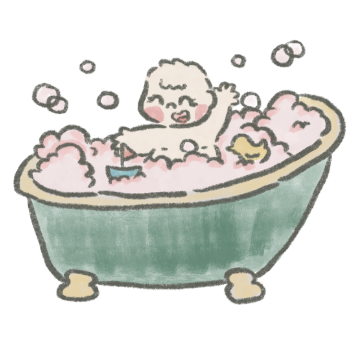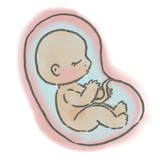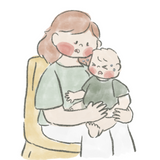How Bath Helps Baby Sleep
Warm baths can be a great addition to your baby's bedtime routine, and it's not just a nice idea — it’s backed by science! Here’s how and why it works:
The Science Behind Warm Baths and Sleep:
When your baby is immersed in warm water, a process called vasodilation occurs, where their blood vessels dilate, increasing circulation. This physiological response helps your baby relax, making it easier for them to settle down for sleep. After a warm bath, as your baby's body cools down, it naturally signals that it's time to prepare for sleep. This cooling process calms the nervous system and alleviates any physical discomfort your baby may experience, setting the stage for a more restful night. Research shows that a slight drop in body temperature can mimic circadian sleep signals, helping babies fall into a deeper sleep more easily.
The Role of Routine in Baby’s Sleep:
The predictability of a warm bath as part of a bedtime routine signals to your baby that it’s time to wind down. Babies thrive on routine, and creating this calm and comforting ritual can significantly improve sleep quality. Make sure to incorporate bath time at the same point in your bedtime routine each night. Over time, your little one will associate bath time with sleep, making the transition to bedtime smoother.
How Warm Baths Soothe Fussiness:
Warm water creates a soothing sensory experience for fussy babies. The gentle undressing, soft splashes, and warmth of the water can ease discomfort and signal that the day is winding down. Ensure the water is warm but not hot—aim for a comfortable temperature that feels soothing against your baby's skin. Additionally, engaging in playful activities during bath time can stimulate your baby's mind while still allowing them to relax. Just be mindful of overstimulation; if your baby becomes too excited during bath time, it may lead to difficulty settling down afterward.
Pay Close Attention to Your Baby’s Feelings:
Bath time can be a soothing experience for babies — or a stressful one — depending on how it’s handled. A 2012 study on Maternal Regulation of Infant Stress, found that even small details, like when you undress your baby, can have a significant impact. Researchers observed that if a baby is undressed too early and left to wait, they may become cold, leading to fussiness and crying. This can cause parents to feel rushed or frustrated, resulting in hurried movements that startle the baby, making the bath more stressful than calming. To avoid this, it’s important to prepare everything before undressing your baby, ensuring a smooth, gentle transition into the water. Being sensitive to your baby’s emotions not only fosters a positive experience but also strengthens your bond and supports their emotional and social development as they grow into childhood and beyond.


 New Zealand Dollar (NZD)
New Zealand Dollar (NZD)
 Hong Kong Dollar (HKD)
Hong Kong Dollar (HKD)
 Japanese Yen (JPY)
Japanese Yen (JPY)
 Singapore Dollar (SGD)
Singapore Dollar (SGD)
 South Korean Won (KRW)
South Korean Won (KRW)
 United Arab Emirates Dirham (AED)
United Arab Emirates Dirham (AED)
 Canadian Dollar (CAD)
Canadian Dollar (CAD)
 British Pound (GBP)
British Pound (GBP)
 Euro (EUR)
Euro (EUR)
 Swiss Franc (CHF)
Swiss Franc (CHF)
 Swedish krona (SEK)
Swedish krona (SEK)







